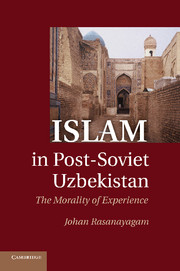Book contents
- Frontmatter
- Contents
- Illustrations
- Acknowledgements
- Note on Transliteration
- MAP: Uzbekistan and its neighbours
- Introduction: Towards an Anthropology of Moral Reasoning
- 1 Islam and Sociality in Pakhtabad and Samarkand
- 2 The New Soviet (Central Asian) Person and the Colonisation of Consciousness
- 3 Good and Bad Islam after the Soviet Union
- 4 The Practical Hegemony of State Discourse
- 5 The Moral Sources of Experience
- 6 Moral Reasoning through the Experience of Illness
- 7 Debating Islam through the Spirits
- 8 Experience, Intelligibility, and Tradition
- Notes
- Bibliography
- Index
2 - The New Soviet (Central Asian) Person and the Colonisation of Consciousness
Published online by Cambridge University Press: 01 March 2011
- Frontmatter
- Contents
- Illustrations
- Acknowledgements
- Note on Transliteration
- MAP: Uzbekistan and its neighbours
- Introduction: Towards an Anthropology of Moral Reasoning
- 1 Islam and Sociality in Pakhtabad and Samarkand
- 2 The New Soviet (Central Asian) Person and the Colonisation of Consciousness
- 3 Good and Bad Islam after the Soviet Union
- 4 The Practical Hegemony of State Discourse
- 5 The Moral Sources of Experience
- 6 Moral Reasoning through the Experience of Illness
- 7 Debating Islam through the Spirits
- 8 Experience, Intelligibility, and Tradition
- Notes
- Bibliography
- Index
Summary
Olimjon, whom I met in 2004, is a lecturer in philosophy at a higher educational institute in Samarkand. He described himself as having been a committed communist in the Soviet period, but since independence, he has become an actively engaged Muslim who regularly attends the Friday prayers at a registered mosque near his university. The mosque was built in the years after independence by staff at his institute, and he was one of the original hundred signatories needed for its registration in 1996. He was born in 1942 and graduated from the history faculty at Samarkand State University. For his military service, he was posted to a district near Moscow, where he rose to a leading position within the branch of Komsomol (the youth organisation of the Communist Party) in his unit. He was proud that he had held this leadership position in a Union-wide context, despite the fact that he was from Central Asia. Olimjon described how, as a youth, he had internalised a communist consciousness during his school and university education. At the same time, from his present perspective as a practicing Muslim after the collapse of the Soviet Union, he maintains his former self at arm's length, explaining his previous consciousness as something he automatically, unreflexively developed in response to the pervasive propaganda to which he had been exposed at school and university, a ‘child's consciousness’, as he described it.
- Type
- Chapter
- Information
- Islam in Post-Soviet UzbekistanThe Morality of Experience, pp. 65 - 95Publisher: Cambridge University PressPrint publication year: 2010

